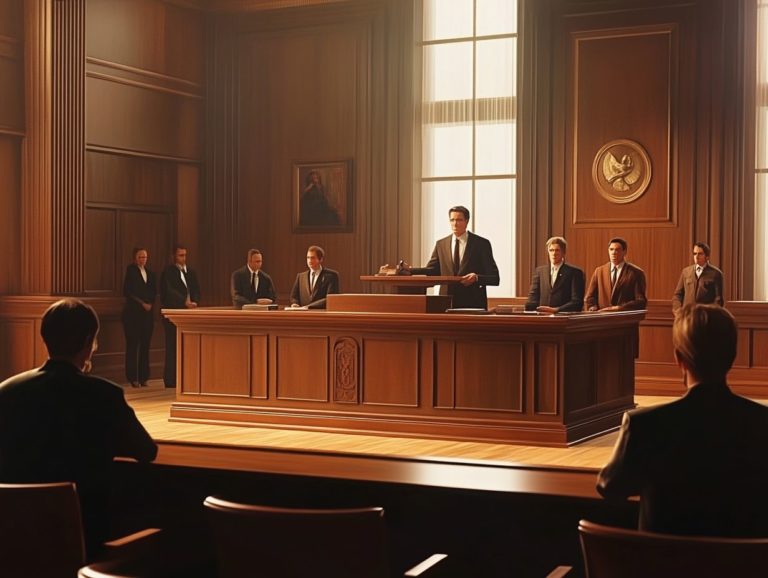The Right to Make a Statement in Court
The right to make a statement in court is a cornerstone of the judicial process, empowering you to share your perspective and actively contribute to the pursuit of justice.
This exploration delves into the vital role statements play in court proceedings, the legal framework that upholds this right, and offers practical tips for preparing and delivering compelling statements.
You ll uncover the implications of making a statement, the challenges that may arise, and alternative avenues to engage in the legal process.
Join us as we explore this essential component of the justice system. Don t miss this opportunity to understand your rights!
Contents
- Key Takeaways:
- The Importance of the Right to Make a Statement in Court
- The Right to Make a Statement: Laws and Regulations
- Legal Basis for the Right to Make a Statement
- How to Exercise the Right to Make a Statement
- Preparing and Delivering a Statement in Court
- The Impact of Making a Statement in Court
- Challenges and Limitations of the Right to Make a Statement
- Alternatives to Making a Statement in Court
- Frequently Asked Questions
- What is the right to make a statement in court?
- Is the right to make a statement in court guaranteed to everyone?
- Do defendants have to make a statement in court?
- Can a defendant’s statements be used against them in court?
- Can a defendant make a statement even if they have a lawyer?
- What should a defendant keep in mind when making a statement in court?
Key Takeaways:

The right to make a statement in court is a fundamental aspect of the legal system, allowing individuals to participate and have their voice heard in the legal process.
Proper preparation and delivery of a statement in court can greatly impact the outcome of a case, both for the individual and the overall case.
While the right to make a statement is important, there may be challenges and limitations. Individuals can also participate in the legal process through alternative means.
The Importance of the Right to Make a Statement in Court
The right to make a statement in court is a fundamental pillar of the legal system, protecting the rights of individuals in both civil and criminal cases. This right gives you the power whether as a plaintiff or defendant to present your viewpoint and share relevant information.
It allows you to contribute meaningfully to the evidence before a judge or jury. This is vital for ensuring that all parties can advocate for themselves and provides a platform for emotional expression that may influence the judge s ruling and the case’s final outcome.
Understanding court procedures and securing quality legal advice can significantly enhance the impact of your statement.
Understanding the Role of Statements in Court Proceedings
In court proceedings, your statements whether they re witness accounts, written declarations, or informal remarks play critical roles in establishing the facts of your case and influencing its outcome.
These statements may contain privileged information and even admissions of guilt, which can significantly shift the responsibility to prove for both you and the opposing party.
During direct examination and cross-examination, the credibility and accuracy of these statements are rigorously tested by attorneys. It is essential for you to have competent legal representation, whether you re a plaintiff or a defendant.
Witness statements often offer firsthand accounts of events. Affidavits are official written statements that can either support or challenge testimonies.
The legal significance of these statements is immense, as they can sway a judge or jury’s perception directly. During direct examination, your attorney will guide you to present a compelling narrative.
Cross-examination aims to unearth inconsistencies or doubts. The precision and clarity of your statements, alongside the skill of your legal team in navigating these processes, shape the trajectory and outcome of your case.
The Right to Make a Statement: Laws and Regulations
The right to make a statement in court is intricately governed by a comprehensive legal framework. This framework encompasses a variety of statutory requirements and testimony rules that dictate how statements should be presented and perceived during courtroom proceedings.
These regulations are designed to uphold the legal rights of all parties involved, ensuring that evidence is meticulously evaluated according to established courtroom protocols.
Grasping these laws is essential for anyone embroiled in legal disputes. This knowledge lays the groundwork for effective legal representation and informed attorney guidance throughout the entire process.
Legal Basis for the Right to Make a Statement
The legal foundation for your right to make a statement stems from constitutional protections and established case law, which affirm your legal entitlement to express your views and present evidence in court. This right allows you to provide a statement and helps you understand how privileged information and courtroom procedures can shape the burden of proof in legal disputes.
Legal representation is crucial. It guides you through these complexities and ensures you effectively exercise your rights.
In many jurisdictions, case law reinforces the principle that you have the right to articulate your position, rooted in fairness and transparency within the judicial process. Landmark rulings have highlighted the importance of giving defendants a platform to share their narratives, significantly influencing the court s evaluation of the evidence presented.
With skilled legal representation, you become well-informed about your rights and responsibilities, especially regarding evidentiary standards and the ramifications of your statements. This expert guidance is vital for crafting your statements and strategically presenting evidence, ultimately impacting the burden of proof that rests on both parties during a trial.
How to Exercise the Right to Make a Statement

Exercising your right to make a statement in court demands careful preparation and a solid grasp of the documentation process. You need to craft a compelling statement that conveys the facts accurately while considering the emotional weight it may carry for the judge and jury.
Consulting with an experienced attorney can greatly elevate the quality and impact of your signed statement, ensuring it adheres to courtroom procedures and meets the necessary standards for admissibility.
Preparing and Delivering a Statement in Court
Preparing and delivering a statement in court involves crafting a written narrative that articulates the facts and arguments essential to your case. An effective statement is structured to enhance its legal weight, addressing the burden of proof while considering how emotionally charged elements can influence the evidence presented before the court.
Having legal representation during this process is vital, as an attorney can guide you in navigating courtroom procedures and presenting your statement effectively.
The art of crafting a compelling narrative requires careful thought. Every word carries significance in the eyes of the law, and organizing your statement logically can substantially bolster its impact.
By weaving in emotional undertones, your statement can resonate more profoundly with those involved, persuading both judges and juries. An attorney’s expertise in balancing these elements can transform a simple recitation of facts into a powerful plea, ultimately aiming to sway the case’s outcome in your favor.
The Impact of Making a Statement in Court
Making a statement in court can profoundly influence your case’s outcome, serving as a crucial piece of evidence for the judge or jury.
The emotional resonance of your statement can create a lasting impression, potentially swaying the judge s ruling by weaving a compelling narrative that supports your legal arguments.
Understanding the legal weight of your words is crucial for your success! This knowledge plays a vital role in pursuing justice and resolution in your legal disputes.
Consult with an attorney today to ensure your voice is heard in court!
Effects on the Case and the Individual
The effects of making a statement in court reach far beyond the immediate legal outcome; they also touch on your emotional and psychological well-being. A well-crafted witness statement can strengthen your case by providing essential evidence that supports legal arguments.
Yet, sharing your story can be both empowering and daunting, stirring up a whirlwind of emotions. That s where legal advice becomes invaluable, guiding you through these complexities and helping you understand your rights and the potential implications of what you say.
By sharing your experiences, you not only contribute to the judicial process but also confront your feelings about what happened. This journey can lead to valuable insights or even a sense of relief, but it may also bring on anxiety or regret.
Skilled legal counsel is crucial; they help you prepare your statements effectively while also managing your emotional responses, fostering resilience in what can often feel like an overwhelming situation.
As you gain clarity on your rights and the intricacies of legal procedures, you can step into court with newfound confidence, transforming anxiety into assertiveness.
Challenges and Limitations of the Right to Make a Statement
While the right to make a statement in court is a fundamental legal privilege you possess, there are several challenges and limitations you may encounter along the way.
Inaccurate statements or the use of offensive language could land you in contempt of court, jeopardizing your credibility in the eyes of the judge. Procedural rules may have specific restrictions on how you present your statements.
This makes it essential for you to seek legal advice and prepare carefully, helping you handle these challenges with assurance.
Obstacles and Potential Issues

Obstacles and potential issues can arise when you’re making a statement in court, from objections to the evidence you present to the risk of inadvertently making statements that could lead to contempt of court. This is why effective legal representation is essential; skilled attorneys are adept at navigating these challenges, addressing objections, clarifying the burden of proof, and presenting evidence in a way that bolsters your case.
You may find yourself grappling with the intricate dynamics of the courtroom, where the opposing side might aggressively challenge the credibility or relevance of your statements. This can heighten anxiety and uncertainty, making it imperative for you to rely on competent legal counsel who can effectively counter these objections.
Legal representation not only assists in expressing your thoughts clearly but also ensures that all of your statements are accurately documented and compliant with legal standards. This ultimately helps you maintain focus on proving your claims beyond a reasonable doubt.
Alternatives to Making a Statement in Court
Making a statement in court is undoubtedly a crucial part of legal proceedings, but if you find yourself feeling uneasy or unsure about expressing your thoughts in such a formal environment, rest assured there are alternatives.
Options like submitting an informal statement or entrusting your legal representative to present your evidence can be excellent substitutes during both direct and cross-examination.
Recognizing these alternatives is empowering. You can still actively participate in the legal process without delivering a formal statement.
Other Ways to Participate in the Legal Process
Ready to make your voice heard in court? Here are effective ways to participate!
Besides making a formal statement, you have several other avenues to engage in the legal process. Each avenue plays a vital role in the dynamics of the courtroom.
By choosing a lawyer, you can ensure that evidence is presented effectively. Informal statements can also shed light on the case in valuable ways. Understanding the rules of testimony and courtroom procedures is essential for any form of participation. This knowledge helps ensure compliance and enhances your overall legal strategy.
For example, you might choose to share your experiences through a deposition instead of appearing in person. This approach can streamline the process and minimize your time spent in court. You also have the option to provide affidavits, which are written statements sworn to be true that support your claims.
Being familiar with the legal guidelines is crucial. This knowledge not only builds your confidence but gives you the power to advocate effectively for your interests. By navigating these paths thoughtfully, you can make sure your voice resonates within the formal confines of the courtroom.
Frequently Asked Questions
What is the right to make a statement in court?
The right to make a statement in court refers to a defendant’s right to speak during their trial and have their words considered by the judge or jury in their case.
Is the right to make a statement in court guaranteed to everyone?

Yes, the right to make a statement in court is guaranteed by the Sixth Amendment of the US Constitution, which grants all individuals the right to a fair and public trial.
Do defendants have to make a statement in court?
No, defendants are not required to make a statement in court. They have the right to remain silent and not incriminate themselves.
Can a defendant’s statements be used against them in court?
Yes, a defendant’s statements can be used against them in court if they choose to make a statement. Defendants should consult their attorney before making any statements in court.
Can a defendant make a statement even if they have a lawyer?
Yes, defendants have the right to make a statement in court even if they have a lawyer. However, it is important for them to discuss their statement with their attorney beforehand to ensure it does not harm their case.
What should a defendant keep in mind when making a statement in court?
A defendant should keep in mind that their statement will be heard by the judge or jury and can potentially impact the outcome of their case. It is important to be truthful, concise, and respectful when making a statement in court.
Act now to ensure your voice is heard! If you have questions, consider consulting with a lawyer for guidance.






